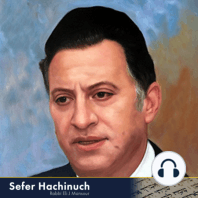20 min listen
Misva #141: The Shelamim Sacrifice
FromSefer Hachinuch
ratings:
Length:
20 minutes
Released:
Feb 16, 2022
Format:
Podcast episode
Description
One of the sacrifices discussed by the Torah in the beginning of the Book of Vayikra (beginning of chapter 3, and 7:11-12) is the Shelamim offering. Generally, Shelamim sacrifices are offered by individuals. The exception to this rule is the special Sheteh Ha’lehem offering brought on Shabuot, which consisted of two sheep and two loaves of bread, that were eaten by the Kohanim. This is the only example of Shalmeh Sibur – a Shelamim sacrifice offered collectively by the nation. Among the various types of Shelamim sacrifices which were offered is the “Shalmeh Hagiga” – the Shelamim sacrifice which one would offer when making his pilgrimage to Jerusalem on Pesach, Shabuot and Sukkot. Another is “Shalmeh Toda” – the thanksgiving offering which one would bring to express his gratitude to G-d after being extricated from a dangerous situation (as discussed below). Yet another type of Shelamim is the offering brought by the Nazir after the successful completion of the period of Nezirut which he had accepted upon himself (“El Nazir”). When a Toda sacrifice was offered, the animal sacrifice was accompanied by forty breads – thirty of which were unleavened, whereas the other ten were baked as Hametz. The Sefer Ha’hinuch explains that the thirty unleavened breads consisted of three groups of ten breads each. The first group was called “Ma’afeh Tanur,” and these were prepared by adding oil to the flour and then baking it. The second type was Rekikim, breads which were baked without oil, with the oil being added after they came out of the oven. The third type, called Murbechet, was prepared by boiling the flour in hot water, after which it was briefly baked and then deep fried, like a donut. Ten Esronim of flour were used for all thirty unleavened breads. The Sefer Ha’hinuch, following the view of the Rambam, maintained that offering a Toda sacrifice is voluntary, and not an obligation. The Sages taught that one would bring a Korban Toda after surviving four dangerous situations – illness, a sea voyage, captivity, and a journey through the desert. This is inferred from the 107 th chapter of Tehillim, which describes people giving praise and offering sacrifices to G-d after being rescued from these four dangers. Nevertheless, the Rambam maintained that this chapter in Tehillim merely encourages offering a thanksgiving sacrifice after safely enduring these experiences, but does not establish a Halachic obligation to do so. Some suggest drawing proof for the Rambam’s position from the Halacha mentioned in the Sifra that Ma’aser Sheni money may be used to purchase a Toda offering. This money (onto which one exchanged the sanctity of the tithe of his produce and brought to Jerusalem) may not be used for obligatory offerings, and thus this Halacha would seem to prove that a Korban Toda is not mandatory. A Kohen who fails to perform the Shelamim sacrifice in the manner prescribed by the Torah is in violation of this affirmative command.
Released:
Feb 16, 2022
Format:
Podcast episode
Titles in the series (100)
Misva #19: The Prohibition Against Eating Hametz on Pesach: Daily Sefer Hachinuch - Brought to you by itorah.com by Sefer Hachinuch
